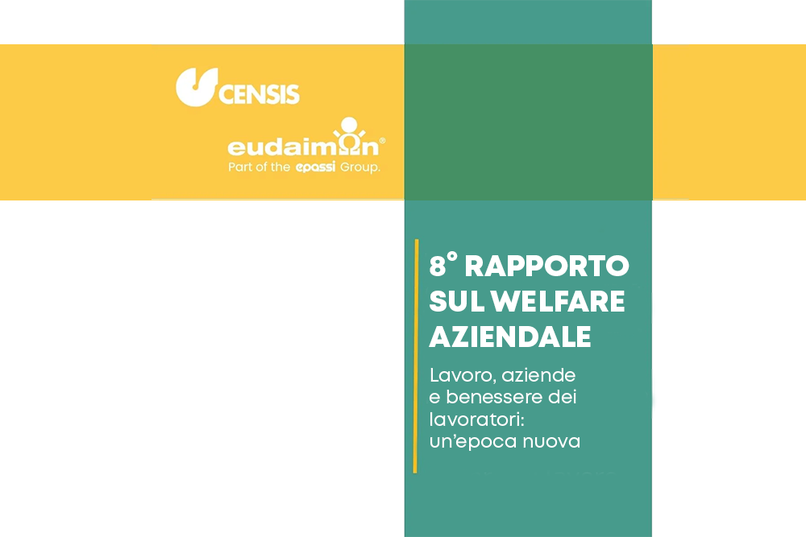Eudaimon report was presented , now in its 8th edition, which analyses in depth the evolving relationship between the world of work, companies and the well-being of Italian workers.
In line with previous editions, the Censis- Eudaimon Report highlights a redefinition of the subjective relationship with work, with essential consequences for companies as well.
In this context - as we will see - serenity and psycho-physical well-being represent a primary objective, achievable only through the offer of increasingly personalized and customizable services.
Let's see what emerges from the annual report with respect to how companies and workers face the needs of Welfare, in a constantly changing economic and social context.
Subjective and Holistic Wellbeing for Today's Workers
The achievement and protection of subjective well-being have become increasingly a priority for people, radically influencing their expectations towards work and companies.
At the heart of this new perspective is the search for holistic well-being , in which physical and mental health coexist.
health first (63.2%), followed by tranquility (42.4%) and balance (34.4%).
It is therefore evident that the psychological and mental dimensions, represented by the concepts of tranquility and balance, now stand alongside the essential pillar of physical health, becoming complementary aspects.
There is also an interest in self-awareness (11.3%), with a growing interest in practices such as meditation and mindfulness .
Compared to the past , in short, the material components of well-being, such as wealth (8.6%) and economic affluence (7.5%), appear much less central.
In this context, workers rigorously scrutinize the different aspects of their work, in relation to the contribution they make or do not make to their own psycho-physical well-being.
83.4% of employees consider it a priority that their work contributes to their holistic well-being, and this belief is shared across various professional categories.
What does all this mean for businesses?
Companies can no longer limit themselves to considering only workers with specific and clear needs, since the desire for well-being is multifaceted, transversal, and translates into diversified requests.
Corporate Welfare and Subjective Well-being of Workers: The Crisis of Traditional Welfare
A crucial element that negatively influences the subjective well-being of workers is the crisis of the traditional welfare system [ 1 ].
In fact, 32.9% of employed workers perceive a worsening of the safety net from social risks, compared to four years ago.
Concerns about the future are significant: only 4.3% believe that the public welfare system will guarantee coverage of essential needs and this uncertainty unloads a multitude of inconveniences, stress and worries on workers.
41.8% of employees said they did not know who to turn to when faced with health problems or other issues.
Corporate Welfare "Wellness Hub"
Faced with this situation, Corporate Welfare takes on an increasingly important role, but - to support this burden - it must be able to adapt to the request!
After having initially integrated incomes and supported consumption, Corporate Welfare can now help companies evolve into real "Wellbeing Hubs" [2 ] .
63.5% of employees are convinced that the company they work for could do a lot to improve their well-being.
This "Wellbeing Hub" should not be limited to offering internal services, but would support workers in identifying and accessing answers to their needs, within the entire welfare system, including public services.
The customization of services and performances is therefore essential to meet the specific needs of each worker.
The Report also highlights a total osmosis between work and private life : workers bring the burden of difficulties and stress of ordinary life into the company, just as they bring work-related frustrations home, in a two-way exchange that is decidedly not favourable to the perceived feeling of overall well-being.
This "corridor syndrome" [3], characterised by the collapse of barriers between work and private life due to excessive stress, is accentuated by the spread of digital technologies and smart working .
As a result, companies are perceived as life contexts where people expect contributions to their well-being, not further discomfort or indifference.
How Companies Can Promote Wellbeing Today
Going into more detail, to promote well-being, companies must consider different dimensions of work, including:
● the content of the activities,
● the role of the worker,
● the business context.
57.8% of workers rated the presence of a peaceful working environment as "VERY IMPORTANT" , 43.4% job autonomy , 55.3 % job safety , 54.4% work-life balance , 51.5% flexible working hours and 59.4% more adequate remuneration .
Serenity, autonomy, security, work-life-balance, flexibility and salary are therefore the 6 new pillars of workplace well-being.
They are therefore increasingly appreciated by employees:
● the increase in benefits through Corporate Welfare (85.8%),
training and development opportunities (84.8%),
physical health initiatives (80.3%),
mental health support services (68.5%).
In other words, the time of the primacy of work and of the company as a neutral space is irreversibly over.
Activating and retaining workers (and talent ) requires companies to develop solutions that combine the individual's psycho-physical well-being with a sense of belonging to the company.
In this scenario, it becomes vital for human resources, HR managers and stakeholders to grasp the depth of this change and respond effectively to the holistic and personalized longing for well-being of workers.
Only companies that will be able to get help from the right Welfare platform , to evolve towards a "Wellness Hub" model, capable of supporting their employees in their entirety, will be able to build a lasting relationship of trust, involvement and motivation.
